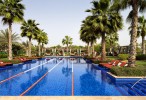Viability director Guy Wilkinson offers his views on the cultural acclimatisation of the limited service brand and uncovers the Kingdom of Saudi Arabia’s secret bed and breakfast network
The best-selling car in the world is the humble Toyota Corolla, with more than 35 million sold as of 2007. The top hotel brands in the world are both in the mid-market: Best Western and Holiday Inn, which had 308,636 and 256,699 rooms under their flags respectively in July 2008, according to the Hotels 325 survey. My point is nothing sells better than something affordable and reliable, especially these days.
Thus one might be forgiven for assuming that of all the new hotel concepts introduced in our region over the past few years, the best poised to weather today’s economic conditions would be the branded, limited-service hotel, epitomised by Ibis and Express by Holiday Inn, which now have a handful of operational GCC properties. Another emerging brand is Premier Inn, with one Dubai unit.

Advertisement
Up until the opening of the first Ibis at Dubai World Trade Centre in 2003, Gulf travellers on a budget had only two choices: to stay at an unbranded hotel or double up in an expensive branded room.
Now there are a select number of branded hotels that emblazon their affordable rates — less than US$100 in several cases this summer — in large signs on the wall outside. It seems clear that this is a good thing, both for guests and in particular, for the operators and developers, who must be congratulating themselves on creating one of the few types of hotel accommodation that is anywhere near recession-proof — being cheap to build, cheap to operate and cheap to stay at.
Admittedly, development programmes have been curtailed somewhat, but that’s due to funding problems and specifically, poor market conditions in Dubai (where most of these hotels are located to date), not to any defect in the concept itself.
Bear in mind, however, that both Ibis and Express have been adapted to pander to GCC customer expectations and are noticeably more luxurious and fully serviced than their original models in Europe and the US.
unlikely imports
The prospect of importing brands with still more limited services, even in the current recession, therefore remains remote. The archetypal budget brands are Accor’s Etap Hotel (two-star) and Formule 1 (one-star). The latter features ‘room vending machines’ to complement a reception that is manned for just a couple of hours in the morning and evening.
Accor has confirmed on several occasions that there is no plan to introduce either to the Middle East yet, and one can understand why.
Recession or no recession, it will surely be a long time before GCC guests of any nationality or economic bracket are prepared to ‘slum it’ for the sake of saving a few dollars, let alone embracing such extreme concepts as easyHotel or the Japanese-style, Kuwait-funded Yotel ‘capsule room’, with letting units of 15- and 10.5m2 respectively.
Why would they, when unbranded hotels of an equivalent price can offer them full amenities of a standard size and full services?
Serviced apartments long ago became accepted as a popular lodging choice in the Gulf, resulting in the entry of hotel chains such as Marriott and Accor at the luxury level.
But strangely, this market sector has lagged behind that of hotels in terms of introducing a true mid-market brand.
This is arguably because ARRs are lower than for equivalent hotels, due to the longer average stay and resultant discounting in serviced apartments, and also because even the deluxe serviced residences generally have limited facilities, unless connected to a full-service hotel.
Accor, predictably, has come nearest to entering the mid-market, having just debuted its four-star SuiteHotel brand near the Mall of the Emirates in Dubai, which offers a mix of suites measuring 30 and 45m², plus a restaurant, a bar, 24-hour deli, pool, fitness room and business corner. By contrast, both the US and Europe are well provided for with true budget ‘extended stay’ brands; my favourite is the Affordable Suites of America!
It is a little known fact that Saudi Arabia, for example, possessed a massive 2437 serviced apartment buildings in 2006, containing 58,239 apartments. Almost all of these are unbranded, low-cost and privately-run, effectively creating the Saudi equivalent of a B&B network.
In today’s economic climate, surely the time is right for an affordable international brand to be profitably introduced into this sector?









 Search our database of more than 2,700 industry companies
Search our database of more than 2,700 industry companies









